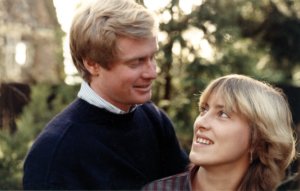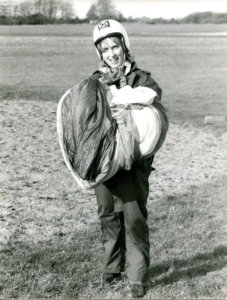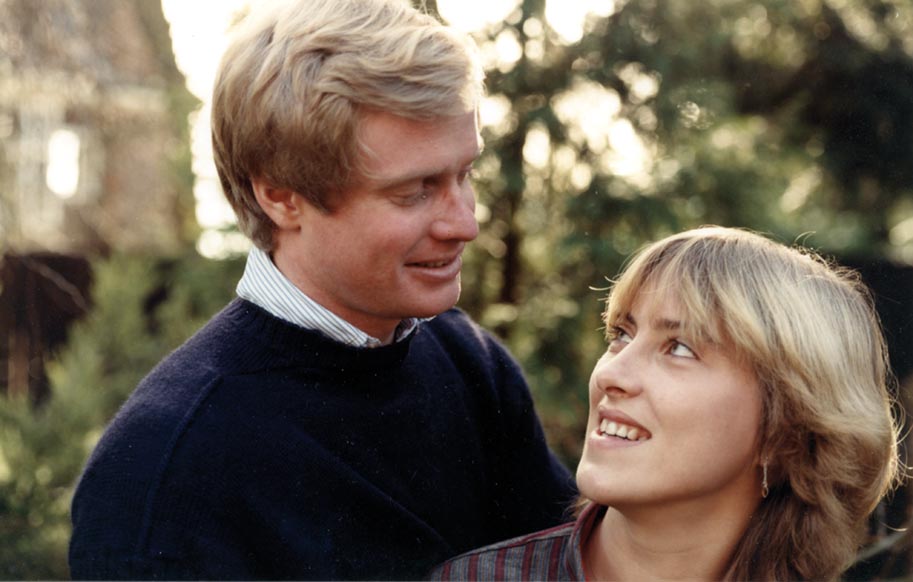 Roz Whistance meets a woman pivotal to the country life of the Island. Susie Sheldon wants everyone to have the chance to enjoy the things she does
Roz Whistance meets a woman pivotal to the country life of the Island. Susie Sheldon wants everyone to have the chance to enjoy the things she does
When you meet Susie Sheldon that age-old truism comes to mind: if you want something done, ask a busy woman.
Susie Sheldon and her husband Jamie live at King’s Manor Farm, set on the salt marshes of the Yar estuary, where they farm rare breed sheep and cattle. But that isn’t the half of it. Susie is Master of the Hunt, and hosts the annual Hunt Ball; she organises the annual Scurry and she presides over King’s Manor’s shoots; she runs a very successful farm shop and café; in her spare time she does the books for Yarmouth Sailing Club, is a school governor and until recently was treasurer of the Pony Club. And now Jamie has taken on Yarmouth’s iconic chandlery, Harwoods.
“Sometimes I do wake up and wish I was a hermit in a one-room croft in Scotland,” Susie confesses. Then, flashing her unconquerable smile: “But it doesn’t last long.”
We are chatting in the reassuringly lived-in sitting room, and cushions, scattered carelessly across the sofas are embroidered mock-grandly with ‘Lord of the Manor’ and ‘Lady of the Manor’: there is not an ounce of Susie Sheldon that plays the grande dame.“King’s Manor used to be called Freshwater Farm, until someone changed the name, thinking it sounded much grander,” she grins. Jamie’s parents bought the house in 1967. “It was in a totally dilapidated state, but they wanted a cottage on the Isle of Wight as a base to go sailing,” she says: and her grin acknowledges that this is no cottage.
The energy Susie exudes comes from an overriding sense of being lucky, and of wanting others to have the chance to try things that she has. “I married Jamie who brought me to this wonderful place.”
They had met at Exeter University, where Susie’s history studies were woven round lots of sport. She’d been Sports Captain at her boarding school, and rode horses at home, and loved to try out anything. It was Jamie who introduced her to sailing: “We got married in 1984 and we launched Damsel, our Daring, two weeks after our wedding. We raced every weekend in Cowes, becoming part of a British team match racing against the Americans, and because we won Cowes Week we were invited to Bermuda race week.” She adds: “Jamie’s a very talented sailor. I’m competent crew.”
 Meanwhile they both worked as accountants in the City, Susie eventually setting up her own practice. But with the onset of children and the desire to take more of a hold on his parents’ farm (“about which I knew nothing” exclaims Susie), their life gradually transferred to a cottage on King’s Manor farm.
Meanwhile they both worked as accountants in the City, Susie eventually setting up her own practice. But with the onset of children and the desire to take more of a hold on his parents’ farm (“about which I knew nothing” exclaims Susie), their life gradually transferred to a cottage on King’s Manor farm.
Then one day Jamie’s mother suggested they swap houses. “She said they didn’t need the space and we did,” says Susie, recalling the momentousness of that act of generosity. “The garden was so immaculate, as was the house. But that’s not quite how I work! At first I worried about what she must think. But she wrote me this lovely letter saying what a pleasure it was seeing the house being used.”
It is certainly used. The grand piano is heaped with sheet music (Jamie is a gifted pianist), the sofas are squishy and the golden retriever and border collie add to the general relaxed feel by rolling over for a tummy tickle. “Fierce working dogs,” jokes Susie. “I can’t imagine life without animals.” Photographs of the Sheldon children are dotted around – Charles, graduated from Oxford and working as a management consultant in London, Sophie, who has graduated from Newcastle and just got her first job with a law firm, and Richie, studying Biology at Bristol University. But the eye is really drawn through the huge window to the ever-changing picture of the salt marshes and the meandering Yar. “We’re terribly lucky,” says Susie. “The children, when they were smaller, used to have terrific mud fights in the river!”
She never forgets her good fortune. The family graduated from mud fights to sailing, in Jamie’s father’s old boat, Palamedes: and Susie races her scow in the river, and occasionally gets out her x-boat. And because she felt all Island children should sail, she was part, years ago, of Yarmouth Sailing Club’s move to get a fleet of Optimists, the little starter boats for children. The Sheldon Oppie, Basil, was used by others long before her eldest child was old enough to sail it. Susie also taught in their annual Oppie Week, and also ran the Royal Solent Dinghy week for some years.
As with sailing, so with riding: “I’ve always ridden, though I don’t do so much now, funnily enough. I am Master of the Hunt, but my horses live in a field.” The Hunt Ball is one thing, she stresses, she doesn’t organise: “I just put on a dress and turn up to a marquee in my garden, where I’m given a bunch of flowers.” This is just a brief respite from her usual role as mover and shaker, however. “Given the marquee is there I usually try to use it for some sort of charity fund-raiser the next day.” They are holding the Game Conservancy Dinner at which cricketer David Gower is the speaker.
 She can’t deny being hands-on when it comes to the Isle of Wight Scurry, however, an event which has grown exponentially over its 20 years. It is very Susie: competitive but not exclusive, something she encourages in others. For years, Susie was Treasurer of the Isle of Wight Pony Club, and at King’s Manor hosted the Pony Club Tetrathlon.
She can’t deny being hands-on when it comes to the Isle of Wight Scurry, however, an event which has grown exponentially over its 20 years. It is very Susie: competitive but not exclusive, something she encourages in others. For years, Susie was Treasurer of the Isle of Wight Pony Club, and at King’s Manor hosted the Pony Club Tetrathlon.
“We had 40 children here regularly: they’d run here, shoot in the barn there, then swim in our pool. (They had to do lots of lengths because it’s only small!)” The riding bit of this four-disciplined event could have been problematic. “Some children had expensive ponies and some of them never had a pony in their life – but they all shared. The great joy of the Pony Club was that the children came from all sorts of backgrounds.”
Teaching children to shoot is part of rural life, she believes, and three or four of the nine shoots a year on the Kings Manor/Dunsbury shoot are specifically for the young. “Hunting and shooting is so much a part of my childrens’ lives that they’re well able to argue their case,” she says, addressing the inevitable question about the rights and wrongs of blood sports. “It’s a great contribution to the rural economy. I don’t shoot, but I’ll always defend it.” She has a rule that anything shot or caught by the children has to be brought into the house, cleaned and dealt with by them, and her son Richie took this to its logical conclusion by asking, for his 16th birthday, to learn to cook fish on a Rick Stein course. “Now he phones me from university, saying ‘Mum I picked up a turbot in the market.’ Gosh, we used to open tins of beans!”
Part of hosting the big outdoor events is having less formal fun with friends. “After the last Hunt Ball we were singing round the piano until nearly 4am! Everything from Beatles, Bob Dylan, to Wagner.”
As well as the Pony Club, Susie was, for many years, a trustee of the Fortune Centre for Riding Therapy, which offers 16-year-old Special Needs children a two-year residential course in the New Forest. “State care stops after they leave school. Here, they learn the horse has to be clean and so do you; has to have a proper diet, so do you.”
She did that until quite recently, but sometimes something has to give. The farm shop, opened last year as a means of making the farm pay, has had a bit of a life of its own thanks to the imagination of its manager, Lucie McArdle, but Susie hadn’t originally anticipated doing her own butchery, which she started once they’d installed a cold room.
The café/shop is on the site of the old dairy, which closed when King’s Manor went organic. (Nobody would collect organic milk from the Island). They began the organic conversion – a complete reversion to traditional farming, rotating crops and using natural fertilisers – five years ago, and this summer their first registered organic beef will be available.
 Even before the push towards organic, the Sheldons planted lots of trees to support the environment, and farming organically has encouraged a wealth of butterflies. Because they were able to buy Thorley Manor Farm across the river their organic approach, with no artificial nitrates running off the land, has benefits for aquatic life too. The birds they see on the river are many, thanks to the unusually varied habitats offered by the salt marshes. Lapwings, curlews and even a flash of kingfisher are seen, “and uncommon things that look like ducks to me!”
Even before the push towards organic, the Sheldons planted lots of trees to support the environment, and farming organically has encouraged a wealth of butterflies. Because they were able to buy Thorley Manor Farm across the river their organic approach, with no artificial nitrates running off the land, has benefits for aquatic life too. The birds they see on the river are many, thanks to the unusually varied habitats offered by the salt marshes. Lapwings, curlews and even a flash of kingfisher are seen, “and uncommon things that look like ducks to me!”
As well as sharing the farm’s space with her various sporting concerns, Susie invites schools to come to see a farm in action, from five-year-olds to A Level biology students. “Anthony, our farm manager loves dealing with the A Level students because they’re so interested. The farm is unusual – we’ve got chalk on the Downs, really clayey bits, and salt marsh. So we’ve got the biggest variety of soil quality you can imagine, and therefore of plant life, in a very small space.”
It isn’t a surprise to hear her say she loves being busy. “I’m a great believer that if you want something done you’ve got to do it yourself. It just seems a shame not to be doing all these things, and for children not to be doing them,” says Susie Sheldon. “And I’ve had such fun doing it.”



